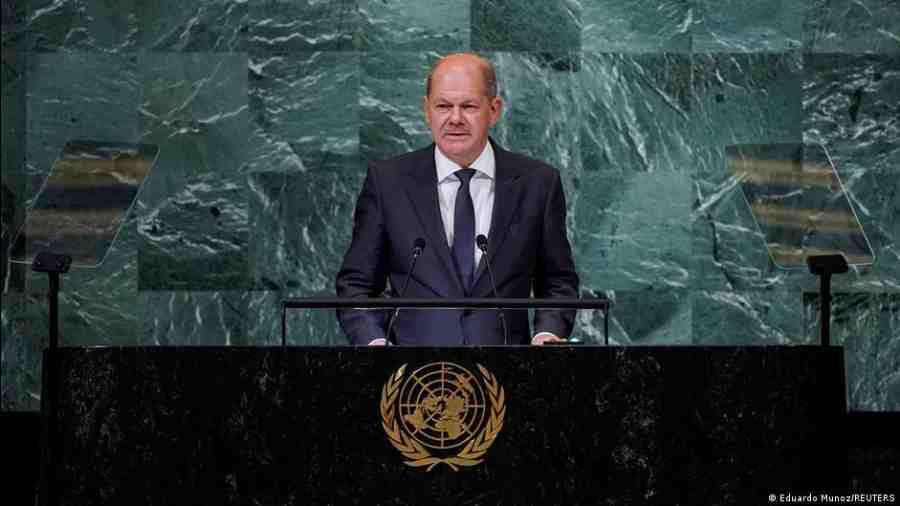German Chancellor Olaf Scholz called Russia's invasion of Ukraine an act of "imperialism plain and simple" at the UN General Assembly in New York City on Tuesday.
Scholz harshly criticized Russia's invasion of Ukraine, decrying Putin's motivation behind the war. "There is no justification whatsoever for Russia's war of occupation against Ukraine. President Putin is waging this war with one single objective: to seize Ukraine."
He went on to appeal to UN member states to not remain neutral in the situation, highlighting the nuclear weapons Russia holds.
"We must not stand idly by when a major nuclear power, armed to the teeth — a founding member of the United Nations and a permanent member of the UN Security Council no less — seeks to shift borders through the use of violence," Scholz said during his speech.
Protecting the international order
The German chancellor repeatedly stressed the importance of upholding a world order based on rules.
"The alternative to a rules-based world is the dominion of the strong over the weak," Scholz warned. "The return of imperialism is not only a disaster for Europe, but also a disaster for our global peace order," he added.
He said Putin risks destroying not only Ukraine, but also his own country with the war.
Scholz went on to say that a multipolar world was "the antithesis to imperialism and neocolonialism," and that these principles needed to be upheld by all of the UN's member states. "And that is why it was so important that here in this room, 141 countries categorically condemn Russia’s war of occupation," he added.
Further, he slammed the idea of Russia holding referendums in parts of Ukraine. "Putin will only give up his war and his imperialist ambitions if he realizes that he cannot win."
"This is why we will not accept a peace dictated by Russia. This is why we will not accept any pretentious referendum. And this is why Ukraine must be able to defend itself against Russia’s invasion," he said.
A global shield against climate risks
Calling climate change the biggest challenge of this generation, the German chancellor reiterated how Germany and other industrialized countries have a special responsibility to tackle the issue and to stand with developing nations that must deal with the results of climate change.
"We will not abandon the countries that are struggling the most in the face of loss and damage as a result of climate change," Scholz assured.
He went on to announce a global shield against climate risks, but didn't add details on what this could entail.
Reforming the UN Security Council
The German chancellor called for the reform of the UN Security Council, proposing that Germany become a permanent member and take up more responsibility within the institution.
Scholz also called for greater cooperation with developing countries from the Global South such as in Asia, Latin America and Africa.
The German chancellor denounced human rights violations in North Korea, Belarus and Syria, and those commited by the Taliban in Afghanistan along with Putin's apparent war crimes in Ukraine. He stressed the importance of not standing idly by when it comes to such violations.
He also made references to China's alleged human rights abuses of the Uyghurs, stating that the country should follow the recommendations of the United Nations Commission on Human Rights in regard to the matter.
Institutions should be reformed to adapt to the reality of the 21st century, he stated, calling more cooperation, more partnership and more involvement the only reasonable response to tackle global challenges.











